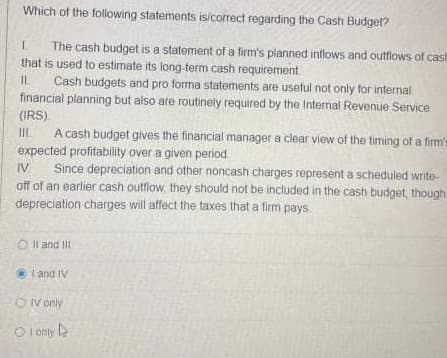Which of the following statements is/correct regarding the Cash Budget? The cash budget is a statement of a firm's planned inflows and outflows of cas that is used to estimate its long-term cash requirement Cash budgets and pro forma statements are useful not only for internal financial planning but also are routinely required by the Internal Revenue Service (IRS) IL A cash budget gives the financial manager a clear view of the timing of a firm expected profitability over a given period IV Since depreciation and other noncash charges represent a scheduled write- off of an earlier cash outflow, they should not be included in the cash budget, thougt depreciation charges will affect the taxes that a firm pays O Il and III I and IV OV only O l onty
Which of the following statements is/correct regarding the Cash Budget? The cash budget is a statement of a firm's planned inflows and outflows of cas that is used to estimate its long-term cash requirement Cash budgets and pro forma statements are useful not only for internal financial planning but also are routinely required by the Internal Revenue Service (IRS) IL A cash budget gives the financial manager a clear view of the timing of a firm expected profitability over a given period IV Since depreciation and other noncash charges represent a scheduled write- off of an earlier cash outflow, they should not be included in the cash budget, thougt depreciation charges will affect the taxes that a firm pays O Il and III I and IV OV only O l onty
Cornerstones of Cost Management (Cornerstones Series)
4th Edition
ISBN:9781305970663
Author:Don R. Hansen, Maryanne M. Mowen
Publisher:Don R. Hansen, Maryanne M. Mowen
Chapter8: Budgeting For Planning And Control
Section: Chapter Questions
Problem 32E: Which of the following describes the order in which the four types of budgets must be prepared? a....
Related questions
Question

Transcribed Image Text:Which of the following statements is/correct regarding the Cash Budget?
The cash budget is a statement of a firm's planned inflows and outflows of cash
that is used to estimate its long-term cash requirement.
Cash budgets and pro forma statements are usetul not only for internal
financial planning but also are routinely required by the Internal Revenue Service
(IRS)
A cash budget gives the financial manager a clear view of the timing of a firm's
expected profitability over a given period
Since depreciation and other noncash charges represent a scheduled write-
off of an earlier cash outflow, they should not be included in the cash budget, though
depreciation charges will affect the taxes that a firm pays
IIL.
IV
O Il and III
land IV
O V only
O I only l
Expert Solution
This question has been solved!
Explore an expertly crafted, step-by-step solution for a thorough understanding of key concepts.
This is a popular solution!
Trending now
This is a popular solution!
Step by step
Solved in 4 steps

Knowledge Booster
Learn more about
Need a deep-dive on the concept behind this application? Look no further. Learn more about this topic, finance and related others by exploring similar questions and additional content below.Recommended textbooks for you

Cornerstones of Cost Management (Cornerstones Ser…
Accounting
ISBN:
9781305970663
Author:
Don R. Hansen, Maryanne M. Mowen
Publisher:
Cengage Learning

Principles of Accounting Volume 2
Accounting
ISBN:
9781947172609
Author:
OpenStax
Publisher:
OpenStax College


Cornerstones of Cost Management (Cornerstones Ser…
Accounting
ISBN:
9781305970663
Author:
Don R. Hansen, Maryanne M. Mowen
Publisher:
Cengage Learning

Principles of Accounting Volume 2
Accounting
ISBN:
9781947172609
Author:
OpenStax
Publisher:
OpenStax College


Managerial Accounting: The Cornerstone of Busines…
Accounting
ISBN:
9781337115773
Author:
Maryanne M. Mowen, Don R. Hansen, Dan L. Heitger
Publisher:
Cengage Learning

Survey of Accounting (Accounting I)
Accounting
ISBN:
9781305961883
Author:
Carl Warren
Publisher:
Cengage Learning

Financial And Managerial Accounting
Accounting
ISBN:
9781337902663
Author:
WARREN, Carl S.
Publisher:
Cengage Learning,